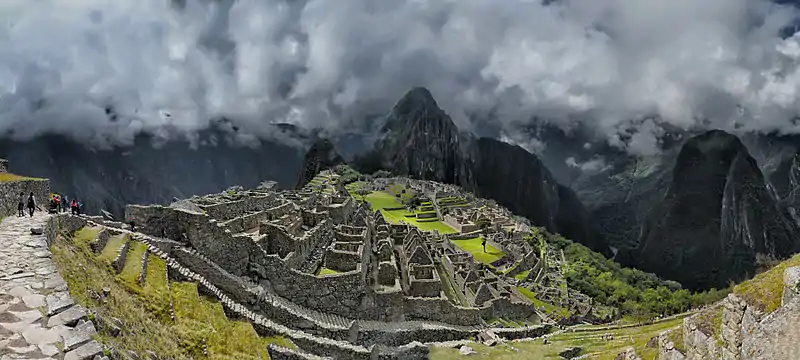Huayna Picchu
Huayna Picchu, Quechua: Wayna Pikchu, is a mountain in Peru which the Urubamba River bends. It is located in the Cusco Region, Urubamba Province, Machupicchu District.[1] It rises over Machu Picchu, the so-called lost city of the Incas. The Incas built a trail up the side of the Huayna Picchu and built temples and terraces on its top. The peak of Huayna Picchu is 2,693 metres (8,835 ft) above sea level, or about 260 metres (850 ft) higher than Machu Picchu.[2]
| Huayna Picchu | |
|---|---|
 Sunrise over Huayna Picchu towering above the ruins of Machu Picchu | |
| Highest point | |
| Elevation | 2,693 m (8,835 ft) |
| Prominence | 260 m (850 ft) |
| Coordinates | 13°09′27″S 72°32′50″W |
| Naming | |
| Native name | Wayna Pikchu |
| Geography | |
 Huayna Picchu | |
| Parent range | Andes |


According to local guides, the top of the mountain was the residence for the high priest and the local virgins. Every morning before sunrise, the high priest with a small group would walk to Machu Picchu to signal the coming of the new day. The Temple of the Moon, one of the three major temples in the Machu Picchu area, is nestled on the side of the mountain and is situated at an elevation lower than Machu Picchu. Adjacent to the Temple of the Moon is the Great Cavern, another sacred temple with fine masonry. The other major local temples in Machu Picchu are the Temple of the Condor, Temple of Three Windows, Principal Temple, "Unfinished Temple", and the Temple of the Sun, also called the Torreon.[3]
Its name is Hispanicized, possibly from the Quechua, alternative spelling Wayna Pikchu; wayna young, young man, pikchu pyramid, mountain or prominence with a broad base which ends in sharp peaks,[4][5] "young peak". The current Quechua orthography used by the Ministerio de Cultura is Waynapicchu and Machupicchu.
Tourism
Huayna Picchu may be visited throughout the year, but the number of daily visitors allowed on Huayna Picchu is restricted to 400. There are two times that visitors may enter the Huayna Picchu Trail; entrance between 7:00–8:00 AM and another from 10:00–11:00 AM. The 400 permitted hikers are split evenly between the two entrance times.[6]
A steep and, at times, exposed pathway leads to the summit. Some portions are slippery and steel cables (a via ferrata) provide some support during the one-hour climb. The ascent is more challenging between November and April because the path up the mountain becomes slippery in the rainy season. Better conditions for climbing can be expected during the dry season, which runs from May to September. There are two trails in varying length that visitors can take to hike to the summit. The shorter trail takes approximately 45–60 minutes to reach the top, which the longer trail takes approximately 3 hours to the summit.
From the summit, a second trail leads down to the Gran Caverna and what is known as the Temple of the Moon.[7] These natural caves, on the northern face of the mountain, are lower than the starting point of the trail. The return path from the caves completes a loop around the mountain where it rejoins the main trail.

In popular culture
- Aguirre, the Wrath of God (1972) was filmed partly on the stone stairway of Huayna Picchu.[8]
- In the Hulu series, The Path, a core belief of the fictional Meyerism movement is that Dr. Stephen Meyer climbed the ladder of burning light atop Huayna Picchu.
See also
 Machu Picchu travel guide from Wikivoyage
Machu Picchu travel guide from Wikivoyage- Putucusi
References
- escale.minedu.gob.pe - UGEL map of the Urubamba Province (Cusco Region)
- "Wayna Picchu: How to climb the mountain behind Machu Picchu". Années de Pèlerinage. Retrieved 2017-02-18.
- Wright, Ruth M. & Valencia Zegarra, Alfredo. (2004) The Machu Picchu Guidebook. Revised edition. Boulder, CO:Johnson Books.
- Teofilo Laime Ajacopa, Diccionario Bilingüe Iskay simipi yuyayk'ancha, La Paz, 2007 (Quechua-Spanish dictionary): wayna - adj. s. m. Joven. Hombre que está en la juventud. pikchu - s. Pirámide. Sólido puntiagudo de varias caras. || Cono. Ch'utu.
- Diccionario Quechua - Español - Quechua, Academía Mayor de la Lengua Quechua, Gobierno Regional Cusco, Cusco 2005: wayna - s. Joven, mozo, adolescente, hombre de 18 a 30 años. SINÓN; q'aqo. pikchu - s. Geog. Pirámide. Cerro o prominencia de base ancha que termina en puntas afiladas. Waynapikchu - s. Arqueol. (Cerro o pico joven) Grupo arqueológico ubicado en la cresta del cerro del mismo nombre, ... Waynapikchu - s. Zool. (Oncideres poecila Bates) Escarabajo serruchador. Orden coleóptera. Familia cerambyeidae. Escarabajos pequeños o grandes, aplanados o cilíndricos con antenas largas, pinzas bucales poderosas que cortan ramas de naranjos, paltos y cacaoteros. || Bot. (Galactia speciosa) Planta herbácea de la zona de ceja de selva.
- "Hiking Huayna Picchu: The Complete Guide". Cachi Life. 2018-11-30. Retrieved 2018-12-08.
- "The Temple of the Moon". Peru Culture. Archived from the original on 2011-03-13. Retrieved 2010-12-05.
- Herzog, Werner & (Cronin, Paul (Editor) (2003). Herzog on Herzog. ISBN 0-571-20708-1.CS1 maint: uses authors parameter (link)